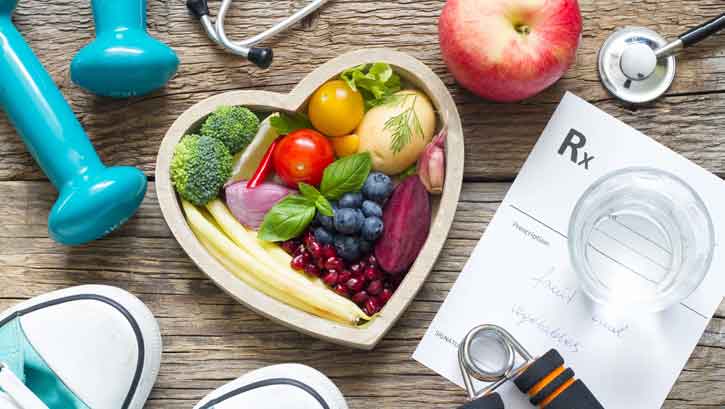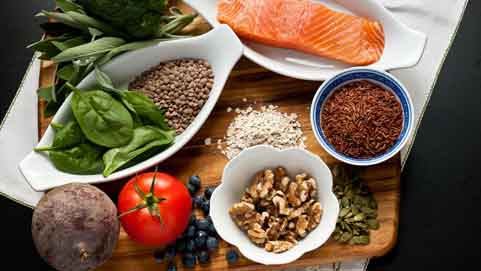Why Healthy Diet is Important

Over time, a healthy diet reduces risk for heart disease, some cancers, type 2 diabetes and obesity. It also gives you more energy and improves your mood on a daily basis.
A healthy diet focuses on the 5 major food groups and limits foods high in saturated fat, added sugars and salt. It’s important to make gradual changes rather than trying to change everything all at once.
1. It’s good for your heart
Healthy eating means getting a variety of nutrients in your food every day. It also includes controlling your weight, managing your blood pressure and blood sugars, and eliminating tobacco and excessive amounts of alcohol.
The right choices include fruits, vegetables, whole grains, low-fat dairy, lean protein and vegetable-based oils (like olive or canola). Avoid processed foods, added sugars, saturated fats and trans fats. Instead, opt for foods rich in monounsaturated and polyunsaturated fats — like avocados, olive oil, nuts and salmon. Also, limit salt by reading the Nutrition Facts label and choosing foods that are low in sodium. A healthy diet can help protect against heart disease, obesity and other chronic noncommunicable diseases (like diabetes and cancer). Developing a good habit of eating healthfully can start in early life.
2. It’s good for your bones
A healthy diet provides a wide variety of nutrients and helps protect against malnutrition, noncommunicable diseases (like heart disease and diabetes) and obesity. It includes a mix of foods from the five food groups, in the recommended amounts.
Eating lots of vegetables and getting plenty of calcium and Vitamin D is important for bone health. So is doing regular weight-bearing exercise, which stimulates bone formation.
Reducing the amount of salt, sugar and saturated or trans fats in your diet is also good for your bones. Drinking too many kilojoule-rich drinks like sodas and alcoholic beverages is not a good idea. Water, unsweetened iced tea or coffee are the best options. Alcohol should be consumed only occasionally.
3. It’s good for your brain

Your brain is a big deal, and your diet can help keep it sharp. Avoid sugary drinks, especially diet sodas (which contain artificial sweeteners), and choose whole foods that are rich in brain-healthy nutrients, such as fatty fish like salmon and trout, leafy vegetables, berries and nuts.
Blueberries, in particular, are a great choice because they contain antioxidants that promote blood flow to the brain and improve focus. Other nutrient-rich foods to add to your diet include sardines, walnuts and flaxseeds. Avoid processed meats and added trans fats, as they can increase your risk of cognitive issues and Alzheimer’s disease.
4. It’s good for your skin
It’s no secret that your diet can make you feel — and look — better. But did you know that it can also help fight signs of aging, acne and other skin problems?
Many wellness influencers, beauty brands and dermatologists encourage people to cut out foods that they think may make their skin worse. This can be a dangerous practice, as it’s easy to cross the line between cutting out foods in an effort to clear your complexion and developing a full-fledged eating disorder, check this site out.
The best way to keep your skin healthy is by eating a variety of vegetables, fruits, lean proteins and whole grains. Aim to fill up on these instead of processed and refined carbohydrates and unhealthy fats (fried foods, sugary desserts). Other dietary nutrients that are good for your skin include antioxidants like vitamin C and vitamin E, which can protect against sun damage, and omega-3 and omega-6 fatty acids found in oily fish, chia seeds, flaxseeds and walnuts.
5. It’s good for your mood
Many of the foods we eat affect how we feel in ways both good and bad. Certain nutrients or chemicals found in foods can improve focus, ease mild depression or increase energy levels, while other foods may exacerbate symptoms of anxiety, stress and depression.
Avoid highly processed and packaged foods, which tend to be high in sugar and unhealthy fats, and instead focus on preparing more meals at home. This will help you control portion sizes and cut out chemicals and added salt.
Conclusion:
Include lots of berries and other low-sugar fruits, as well as vegetables, whole grains and lean proteins. Also add healthy fats like those found in avocado, olive oil and nuts to balance out your diet. Eating these nutrient-rich foods will keep you feeling balanced and happy.
